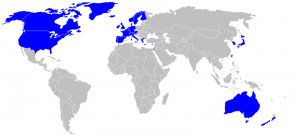
The small window into the effects of modern life on the way we think was opened just a little wider recently by an interesting article by Joseph Heinrich and others. They sift through a large number of studies of people living the industrialized life and their more rural counterparts to find real differences in they way these different groups think.

In the image above, the San foragers would be right, the two lines are the same length, but your typical Western, Educated, Industrialized, Rich, and Democratic (WEIRD) person would need to the left line to be about 20% longer for them to say they were identical. Why this is, I can’t say, but it might be that our visual perception is colored at an early age by the carpentered edges we see around us. Or maybe not.
And it’s not just in vision. WEIRD people think of fairness and co-operation in decision-making, and where things are relative to the self differently too, and their kids tend not to be able to identify easily with other species. The latter result is likely because of the “nature deficit“. The article clearly demonstrates that people think very differently, in very fundamental ways, if they come from modern environments.
The paper, found via Big Questions Online and Edge, is a fascinating read, and not too bad coming from a technical journal. There are a lot of interesting results summarizing a lot of behavioral science research. As a reminder to remember that one scientific article, no matter how good it is, remains just one perspective. the paper’s pdf has a number of commentaries and criticisms attached from other behavioral science researchers.

What I’m still trying to process, are the implications for Montessori educational philosophy. Because there are these significant, large differences in the way people see the world, we need to be aware of the perspectives of our audience. Students also need to appreciate how cultural differences affect the way we think and see the world that influence how we argue and how we behave. Yet they also need to recognize the there are some subjects, say the physical sciences, that are objective; there is a single, definite truth (for some value of definite) about the composition of a water molecule.